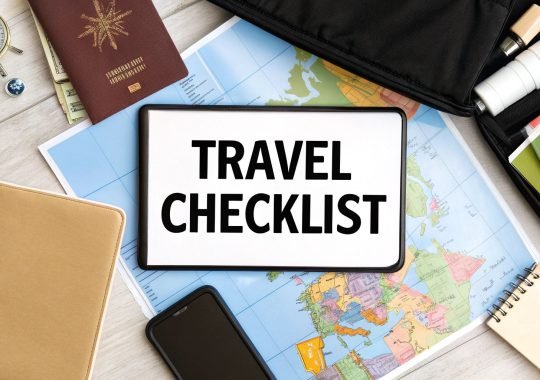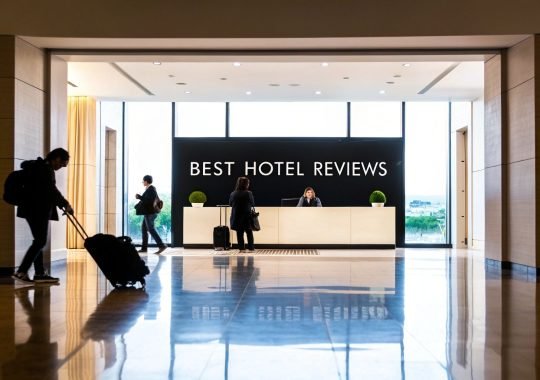Getting a hotel upgrade often feels like winning the lottery, but it’s far less about random luck and much more about smart strategy. The secret isn’t some complicated trick; it’s about positioning yourself as the kind of guest a hotel wants to reward.
Think of it this way: booking directly with the hotel, joining their loyalty program, traveling when they aren’t sold out, and simply being polite at check-in are the small hinges that swing big doors. These actions signal that you’re a valued guest, not just another anonymous booking, and that alone can dramatically boost your odds of scoring a better room.
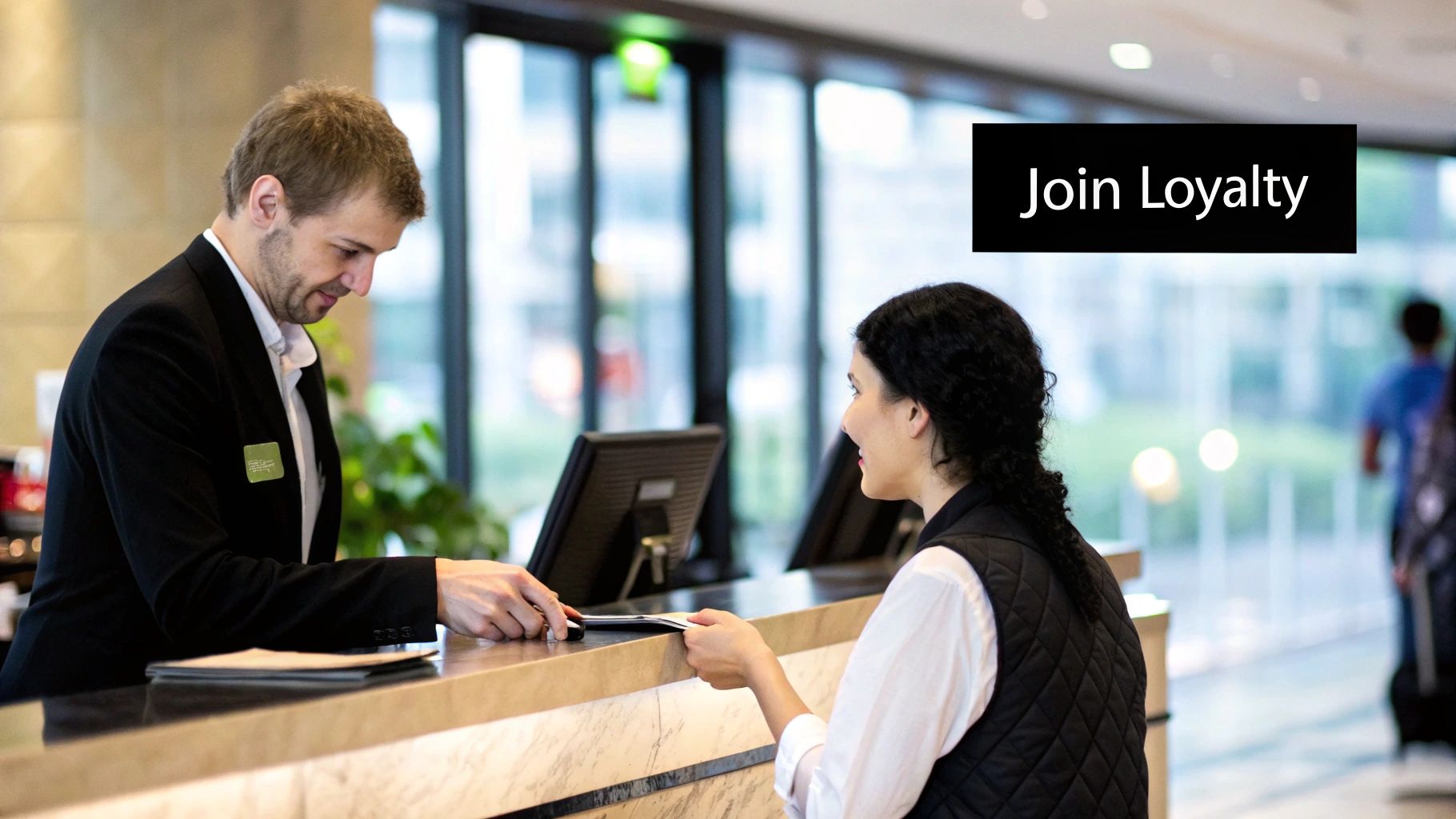
Understanding the Hotel Upgrade Landscape
A surprise upgrade can completely transform a trip, turning a standard stay into something truly memorable. It’s that unexpected touch of luxury—maybe a corner room with stunning panoramic views or a spacious suite you definitely didn’t pay for. To make this happen more often, you need to see things from the hotel’s side of the counter.
For them, an upgrade is a powerful tool. It’s about managing their room inventory and, most importantly, creating an amazing guest experience.
An empty suite or a premium view room isn’t making the hotel any money for the night. It’s a perishable asset. By giving that room to a deserving guest, the hotel creates a “wow” moment with almost no extra cost. That goodwill often turns into glowing reviews, repeat business, and positive word-of-mouth recommendations—all priceless in today’s competitive market.
What Constitutes an Upgrade
Not all upgrades are created equal, and it helps to know what you might be offered. Having realistic expectations helps you tailor your approach and appreciate whatever you get.
Upgrades can range from subtle to spectacular:
- Better View: This is a common one. Think moving from a room facing the parking lot to one with a city skyline, ocean, or garden view.
- More Desirable Location: Getting a room on a higher floor (quieter and often with better views) or one far away from the noisy elevator or ice machine.
- Larger Room: An upgrade from a standard “cozy” room to a deluxe or executive room with more square footage to stretch out in.
- Full Suite: This is the jackpot. It’s a move to a room with genuinely separate living and sleeping areas, and it feels like a completely different class of stay.
An upgrade is always a business decision for the hotel. They’re most likely to reward guests who are loyal, easy to please, and low-maintenance. Your goal is to be that guest.
The Business of Guest Satisfaction
At its core, the hospitality industry runs on positive experiences. The global hotel market hit an incredible $1.5 trillion in 2023, and with a staggering 93% of guest reviews being positive, it’s clear that keeping guests happy is the name of the game.
Hotels are getting smarter, too. Many now use dynamic pricing for upgrades to fill their best rooms, which actually creates more opportunities for travelers who know how to ask. This intense focus on guest satisfaction and smart revenue management is precisely why knowing a few simple strategies is more valuable than ever. You can dig into more hotel industry trends and statistics on Statista.com.
Upgrade Strategies at a Glance
To make it even clearer, here are some of the most effective strategies at a glance. We’ll dive into the details of each one, but this table gives you a quick summary of what works and why.
| Strategy | Key Action | Best For |
|---|---|---|
| Loyalty Program Status | Reaching elite status with a hotel chain like Marriott Bonvoy or Hilton Honors. | Frequent travelers who can consolidate stays with one brand. |
| The “Sandwich” Method | Placing a cash tip between your ID and credit card at check-in while asking politely. | Hotels in tipping cultures (like the U.S.), especially Las Vegas. |
| Direct Booking | Booking your stay directly on the hotel’s website instead of a third-party site. | Almost everyone. Hotels prefer direct bookers and treat them better. |
| Timing Your Trip | Traveling during the off-season or checking in late in the day. | Travelers with flexible schedules looking for better odds. |
| Special Occasions | Mentioning a celebration like a birthday, anniversary, or honeymoon. | Couples and anyone celebrating a genuine milestone. |
Each of these methods has its place, and the real magic happens when you start combining them. A loyal guest traveling off-peak who mentions an anniversary at check-in? That’s a recipe for success.
Strategic Booking for Upgrade Potential
Your quest for a better room doesn’t start at the check-in desk; it begins the moment you decide to book. Seriously. The choices you make online can completely change your odds, flagging you as a priority guest before you even pack your bags. How and where you book is a huge piece of the puzzle.
Booking directly with the hotel is one of the smartest first moves you can make. When a hotel avoids paying a 15-20% commission to an online travel agency (OTA), you immediately become a more valuable customer in their eyes. This alone makes them far more willing to toss a few perks your way, including a complimentary upgrade.
It’s a simple step, but it separates you from the masses and shows you’re invested in their brand. For more ways to lock in the best prices, check out our guide on how to get the best hotel rates.
Join the Club: Loyalty Programs are Your Friend
Even if you only travel a couple of times a year, signing up for a hotel’s loyalty program is a no-brainer. It’s almost always free and instantly puts you on a different list than the average guest. Hotels use upgrades to nurture loyalty, so even entry-level members are often prioritized over someone with no affiliation at all.
Picture this: the front desk agent has two identical reservations for a standard king room but only one corner suite left. One guest is a loyalty member, the other isn’t. Who do you think gets the suite? It’s an easy, low-cost way for them to reward a guest who has already shown some love for their brand.
Key Insight: A loyalty number on a reservation signals a potential long-term relationship. Hotels are much more likely to invest in that relationship with a small gesture like an upgrade, hoping it brings you back again.
This flow chart breaks down how to make your booking more upgrade-friendly.
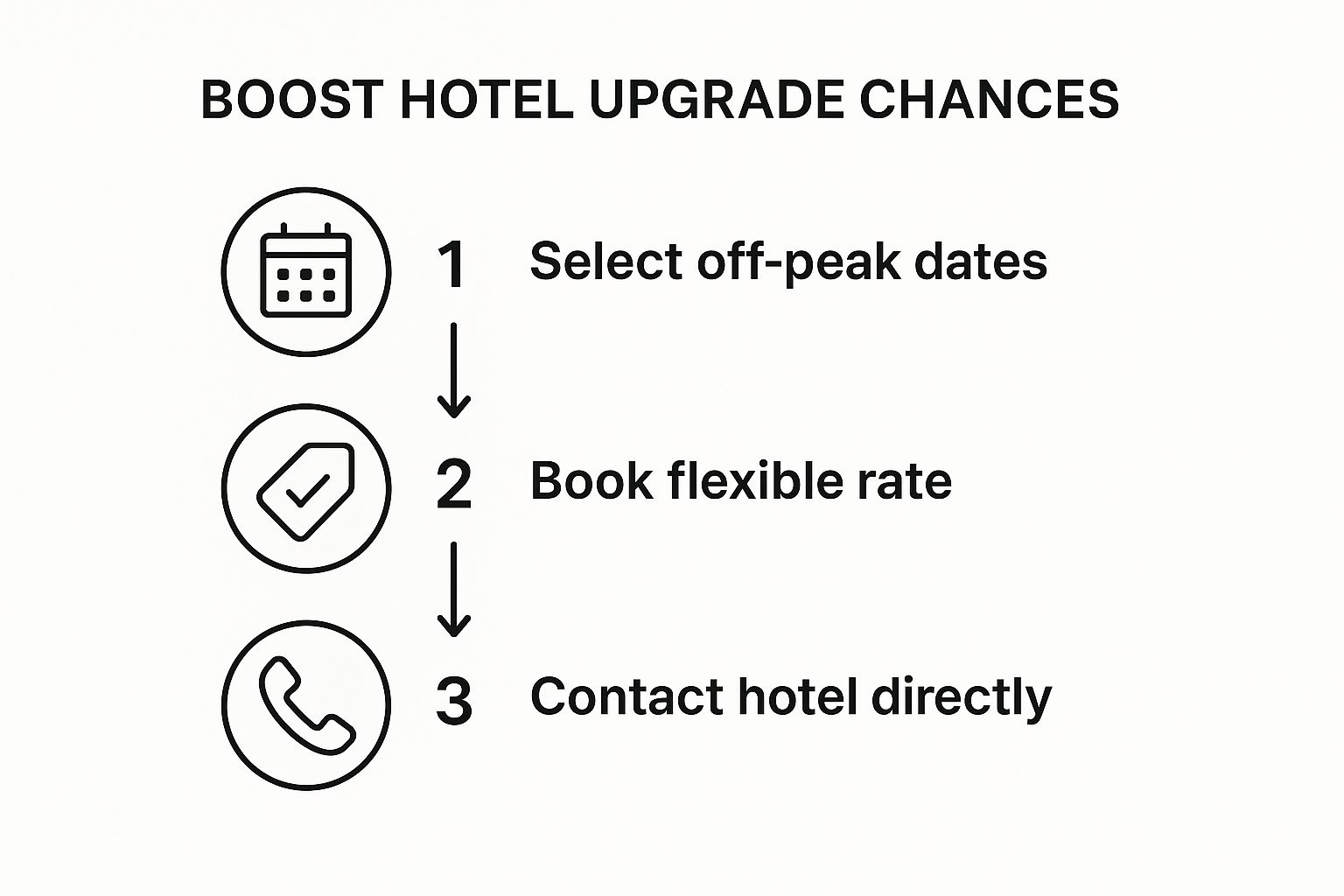
Hitting these points—traveling during quieter times, avoiding restrictive pre-paid rates, and talking directly with the hotel—makes you the perfect candidate for that coveted bigger room.
Tap into Premium Booking Channels
If you’re looking for an even stronger advantage, booking through certain luxury channels can feel like a cheat code. These programs have established relationships with high-end hotels, and their clout often translates into guaranteed benefits for you.
Here are a few power players to consider:
- Luxury Travel Networks: Services like Virtuoso or Four Seasons Preferred Partner (FSPP) are built for this. Advisors in these networks have personal connections that can secure not just upgrades, but also perks like free breakfast, resort credits, and early check-in.
- Premium Credit Card Programs: Cards like The Platinum Card® from American Express give you access to the Fine Hotels + Resorts program. A room upgrade upon arrival (when available) is one of its signature benefits.
Booking this way immediately elevates your status. Some travelers report an upgrade success rate as high as 80% on shorter stays, though it definitely depends on how full the hotel is. It’s much easier for a hotel to upgrade you for a one or two-night stay than for a full week. By booking strategically, you stop hoping for an upgrade and start creating the perfect conditions for one to come to you.
Mastering the Check-In Moment
All your research, loyalty points, and careful booking boil down to one critical moment: the check-in. This is where the magic happens. The front desk agent holds all the cards—and the keys—so building a little genuine rapport can make all the difference. Your approach here is everything.
Timing your arrival can give you a serious edge. While checking in super early might guarantee you a room, it probably won’t be the best one. The real sweet spot is often in the mid-to-late afternoon, around 3-5 PM. By then, the hotel staff has a clear picture of their inventory for the day. They know who has checked out, which rooms are clean, and, most importantly, who the no-shows are. This gives them the wiggle room to move you into something special.

The Art of the Polite Inquiry
When you walk up to that desk, kindness is your best currency. Just think about it—front desk agents deal with tired, stressed, and often demanding travelers all day long. Being a breath of fresh air by being friendly, patient, and smiling makes them actually want to help you out.
Instead of a blunt, “Can I get an upgrade?” try a softer, more conversational approach. You want to ask without sounding like you expect it.
Here are a few lines that have worked for me:
- “I know this might be a long shot, but if there happens to be a complimentary upgrade available, I would be so incredibly grateful.”
- “We’re so excited for our stay. I was just wondering if any corner rooms or perhaps a room with a nice view might have opened up?”
This kind of phrasing immediately shows that you see an upgrade as a generous gesture, not a demand.
Pro Tip: Don’t lie. Ever. Mentioning a special occasion is a classic move, but only if it’s true. A seasoned hotelier can spot a fake anniversary from a mile away, and it can completely backfire. A genuine birthday or celebration, on the other hand, adds a personal touch that’s hard for anyone to ignore.
Setting the Scene for Success
Your vibe and a few subtle cues can heavily influence the outcome. You want to present yourself as the ideal guest to receive a little extra TLC.
- Travel Solo or as a Couple: It’s way easier for an agent to upgrade a single traveler or a couple than a large family needing connecting rooms or multiple beds. That premium king suite is a much more likely upgrade.
- Keep Your Stay Brief: A short stay of one or two nights makes you a perfect candidate. From the hotel’s perspective, they aren’t losing out on much potential revenue by giving you a better room for a short period versus an entire week.
- Mention Your Loyalty: A simple, friendly, “I’ve really been looking forward to this stay; I’m a Hilton Honors member,” is all it takes. It’s a gentle reminder of your status without being pushy.
At the end of the day, your goal is to connect with the agent on a human level. Ask how their day is going. Be warm and understanding if they seem busy. This simple kindness, combined with smart timing and a polite question, is the most powerful tool you have for how to get hotel upgrades right at the check-in counter. It’s not a transaction; it’s a conversation.
Smart Tactics Beyond a Free Request
While a free upgrade feels like the ultimate travel jackpot, sometimes a small, strategic investment can pay off big time in comfort and experience. It’s about looking past the simple polite request and exploring other ways to snag a better room, especially when the hotel is packed. These aren’t about begging; they’re about making a smart offer that works for both you and the front desk.
One of the most legendary moves is the “$20 sandwich” or the tip trick. The classic approach is to slide a folded bill between your ID and credit card at check-in while asking if any complimentary upgrades might be available. While its glory days might be a bit faded, especially outside of tipping hubs like Las Vegas, the idea behind it is still solid. It’s a small gesture of appreciation that makes your request memorable.
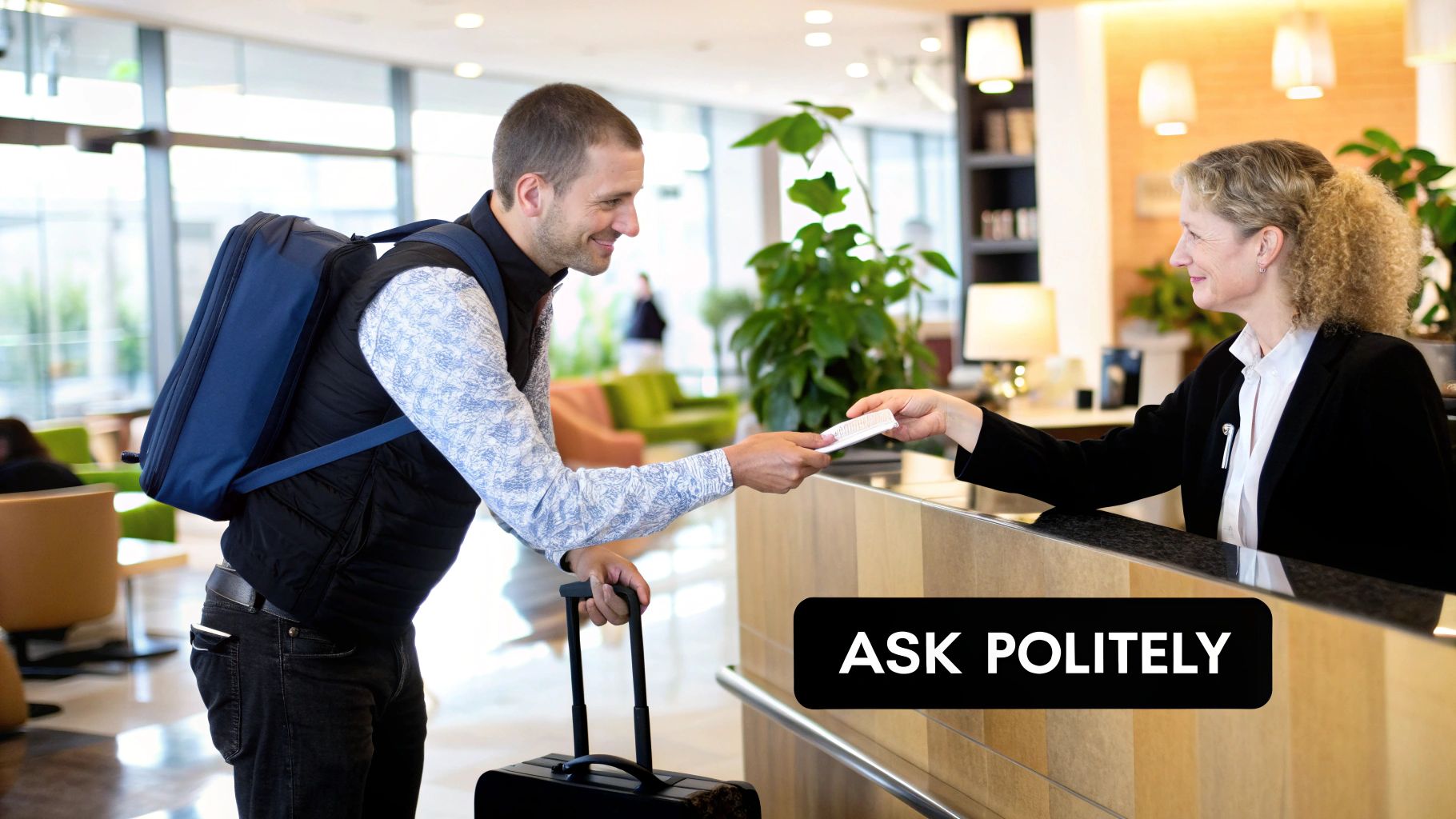
The Rise of Standby Upgrades
A more modern and structured approach is the growing trend of standby upgrade programs. Often managed through third-party platforms like Nor1, these systems are a game-changer for both travelers and hotels.
Here’s how it works: after you book, you might get an email offering you the chance to bid on or buy an upgrade for a small fee. It’s a brilliant way for hotels to fill premium rooms that would otherwise go unsold.
For you, this is a fantastic opportunity. You can land a suite or a room with a premium view for just a fraction of the price you’d pay to book it directly. It’s a classic low-risk, high-reward situation.
The key takeaway here is that these programs are designed for mutual benefit. Hotels make extra money on rooms that would be empty, and you get to experience a bit of luxury for less. It’s a calculated move that feels more like a smart buy than a gamble.
These systems are incredibly effective for hotels. In fact, some research by INFORMS.org shows that standby upgrade programs can boost a hotel’s annual revenue by up to 35%. They work best in upscale properties with a healthy mix of premium rooms, where they can capture extra revenue while seriously boosting guest satisfaction.
Making a Compelling Paid Offer
If you don’t get an automated offer, you can always create your own right at the front desk. This goes beyond just a tip—it’s about making a direct, reasonable offer to pay for a better room.
Here’s how to do it without sounding pushy:
- Be Specific: Don’t just ask for “an upgrade.” Instead, inquire about moving to a particular room type. Try something like, “I noticed you still have junior suites available online. What would the upgrade fee be for my two-night stay?”
- Show You’re Flexible: Frame it in a way that gives them an easy “yes.” For example: “If you happen to have any last-minute availability, I’d be interested in paying a small fee to upgrade to an ocean-view room.” This shows you’re open to a deal that helps them out.
- Negotiate Respectfully: If they come back with a price, it’s perfectly fine to counter, but keep it polite. A simple, “Would it be possible to do it for $50 a night?” can work wonders.
This strategy positions you as a savvy traveler who understands value, not just someone looking for a handout. By recognizing the hotel’s need to fill every room and making a compelling, low-cost offer, you can turn a totally fine stay into a truly extraordinary one.
Becoming a Guest They Want to Reward
Let’s be honest, the ultimate strategy for getting hotel upgrades isn’t some clever trick you pull at check-in. It’s about playing the long game. While a well-timed ask can certainly work for a one-off trip, the real magic happens when you build a reputation as a guest the hotel genuinely wants to impress.
It’s about becoming the person they want to reward, often with proactive upgrades and consistent perks you never even have to ask for.
The foundation of this whole approach is simple: be a repeat guest. Loyalty isn’t just about racking up points; it’s about familiarity. When the front desk team recognizes your name on the arrivals list, you’re no longer just another reservation number. Even visiting the same hotel once a year can be enough to establish you as a regular they’ll want to take care of.
Make Your Loyalty Known
Now, just because you’re a repeat guest doesn’t mean you should assume the hotel’s computer system will automatically roll out the red carpet. Sometimes, a gentle and friendly reminder is all it takes.
When making your reservation, try adding a simple note in the comments section. Something like, “So excited to be returning to my favorite hotel in the city!” can work wonders. This small touch personalizes your booking and signals that you’re a genuine fan, not just a transactional customer. It immediately shifts the dynamic.
For a deeper dive into building this kind of relationship, check out our complete guide to hotel rewards tips. This kind of friendly recognition primes the staff to look for ways to make your stay special, and a room upgrade is often the easiest and most impactful way for them to say “welcome back.”
Provide Thoughtful Feedback
Hotels live and die by guest feedback, but how you give it can make all the difference in how they see you. If you run into a minor issue, don’t make a scene in the lobby. Instead, mention it quietly and politely to the staff during your stay. This gives them a chance to fix it and shows them you’re a reasonable person, not a chronic complainer.
After you check out, take a few minutes to fill out that post-stay survey. Be specific and balanced. One of the most powerful things you can do is mention employees by name who gave you great service. This kind of praise almost always makes its way back to the general manager.
A thoughtful, well-written online review can be just as powerful. Instead of a generic five-star rating, write a detailed account of what you loved. This not only helps other travelers but also gets noticed by hotel management, cementing your status as a guest worth remembering.
The Power of Being a Great Guest
At the end of the day, the best way to get treated like a VIP is to act like one. I don’t mean being demanding or entitled—quite the opposite. It means being the kind of guest that the staff genuinely enjoys welcoming back.
Here’s what that looks like in practice:
- Be Appreciative: A simple, sincere “thank you” for any gesture, big or small, goes a surprisingly long way.
- Be Low-Maintenance: Try not to be the guest who calls the front desk every ten minutes with minor requests. Be self-sufficient when you can.
- Be Personable: Make a little effort to learn a few names. A friendly “Good morning, Maria!” to the person at the breakfast station or a quick chat with the doorman builds real rapport.
By being a considerate, appreciative, and friendly guest, you create a positive reputation that precedes you. This transforms the upgrade game from a hopeful roll of the dice into an anticipated reward for your loyalty and kindness.
Your Top Hotel Upgrade Questions, Answered
Even with a solid game plan, you’re bound to have a few questions when it’s time to actually score that better room. It can feel like a bit of an art form, but once you understand the moving parts, you can approach the front desk with a lot more confidence.
Let’s break down some of the most common situations travelers run into when trying to land that sweet, sweet upgrade.
Does Complaining About My Room Help?
Let’s be real: faking a complaint is a bad look. While a legitimate issue—say, a broken AC unit or a dirty room—is a perfectly valid reason to ask for a new room (which might turn into an upgrade), inventing a problem is a risky game.
Front desk agents have seen it all. They can spot a disingenuous complaint from a mile away, and it instantly kills any goodwill you might have had. A polite, respectful approach always wins. If something is genuinely wrong, state the problem calmly and give them a chance to fix it. If you’re just hoping for more space, it’s much better to ask for it directly and politely when you check in.
Is It Better to Book a Mid-Tier Room?
Yes, absolutely. There’s a real strategic edge to booking one level above the most basic room. Think about it from the hotel’s perspective: it’s much easier for them to justify a single-category jump, like moving you from a “Deluxe Room” to a “Junior Suite.”
When you book the cheapest “Standard” room, you’re just one of a huge crowd of people hoping for a freebie. By putting a little more skin in the game, you signal that you value comfort and are a more promising candidate for the next available premium space.
Key Insight: Booking a mid-tier room makes the upgrade a smaller, more digestible leap for the hotel. It shows you’re willing to pay for a better experience, making them more likely to bump you up as a gesture of goodwill.
Can I Email the Hotel Before My Stay?
This is one of my favorite proactive moves, and it works surprisingly well. Shooting a friendly email to the hotel a few days before you arrive is a fantastic strategy. It gets your request in front of the right people, away from the chaos of a busy check-in line.
Keep your email polite, friendly, and short. This is the perfect time to subtly mention your loyalty status or if you’re celebrating a special occasion. Frame it as a hopeful ask, not a demand. Something like, “we would be so grateful if a complimentary upgrade were available” goes a long way.
This professional touch often pays off because it gives the hotel manager time to look at your reservation and potentially block a better room for you in advance. It helps them, and it makes you look like the exact kind of thoughtful, organized guest they love to reward.
At HotelsEscape, we’re dedicated to helping you travel smarter. For more expert tips, exclusive hotel deals, and honest destination reviews, visit us at https://www.hotelsescape.com.


